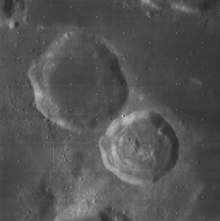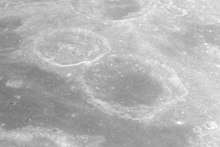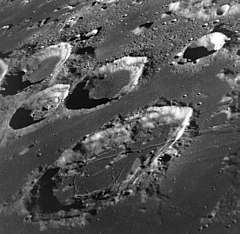Magelhaens (lunar crater)
Magelhaens is a lunar impact crater that lies along the southwestern edge of the Mare Fecunditatis, in the eastern part of the Moon's near side. It was named after 16th-century Portuguese explorer Ferdinand Magellan.[1] It lies to the south-southwest of the crater Goclenius, about midway between Gutenberg to the northwest and Colombo to the southeast.
 Lunar Orbiter 4 image of Magelhaens (upper left) and Magelhaens A (lower right) | |
| Coordinates | 11.9°S 44.1°E |
|---|---|
| Diameter | 41 km |
| Depth | 2.0 km |
| Colongitude | 316° at sunrise |
| Eponym | Ferdinand Magellan |

This crater has a somewhat slender and uneven outer rim that is only roughly circular. The slightly smaller satellite crater Magelhaens A is attached to the southeastern rim. Within the inner walls of Magelhaens, the interior floor has been resurfaced by basaltic lava, matching the same dark appearance as the lunar mare to the northeast. This floor is level and almost featureless.
Satellite craters
By convention these features are identified on lunar maps by placing the letter on the side of the crater midpoint that is closest to Magelhaens.
| Magelhaens | Latitude | Longitude | Diameter |
|---|---|---|---|
| A | 12.6° S | 45.0° E | 32 km |
See also
References
- "Magelhaens (lunar crater)". Gazetteer of Planetary Nomenclature. USGS Astrogeology Research Program.
- Andersson, L. E.; Whitaker, E. A. (1982). NASA Catalogue of Lunar Nomenclature. NASA RP-1097.CS1 maint: ref=harv (link)
- Bussey, B.; Spudis, P. (2004). The Clementine Atlas of the Moon. New York: Cambridge University Press. ISBN 978-0-521-81528-4.CS1 maint: ref=harv (link)
- Cocks, Elijah E.; Cocks, Josiah C. (1995). Who's Who on the Moon: A Biographical Dictionary of Lunar Nomenclature. Tudor Publishers. ISBN 978-0-936389-27-1.CS1 maint: ref=harv (link)
- McDowell, Jonathan (July 15, 2007). "Lunar Nomenclature". Jonathan's Space Report. Retrieved 2007-10-24.CS1 maint: ref=harv (link)
- Menzel, D. H.; Minnaert, M.; Levin, B.; Dollfus, A.; Bell, B. (1971). "Report on Lunar Nomenclature by the Working Group of Commission 17 of the IAU". Space Science Reviews. 12 (2): 136–186. Bibcode:1971SSRv...12..136M. doi:10.1007/BF00171763.CS1 maint: ref=harv (link)
- Moore, Patrick (2001). On the Moon. Sterling Publishing Co. ISBN 978-0-304-35469-6.CS1 maint: ref=harv (link)
- Price, Fred W. (1988). The Moon Observer's Handbook. Cambridge University Press. ISBN 978-0-521-33500-3.CS1 maint: ref=harv (link)
- Rükl, Antonín (1990). Atlas of the Moon. Kalmbach Books. ISBN 978-0-913135-17-4.CS1 maint: ref=harv (link)
- Webb, Rev. T. W. (1962). Celestial Objects for Common Telescopes (6th revised ed.). Dover. ISBN 978-0-486-20917-3.CS1 maint: ref=harv (link)
- Whitaker, Ewen A. (1999). Mapping and Naming the Moon. Cambridge University Press. ISBN 978-0-521-62248-6.CS1 maint: ref=harv (link)
- Wlasuk, Peter T. (2000). Observing the Moon. Springer. ISBN 978-1-85233-193-1.CS1 maint: ref=harv (link)
| Wikimedia Commons has media related to Magelhaens (crater). |
